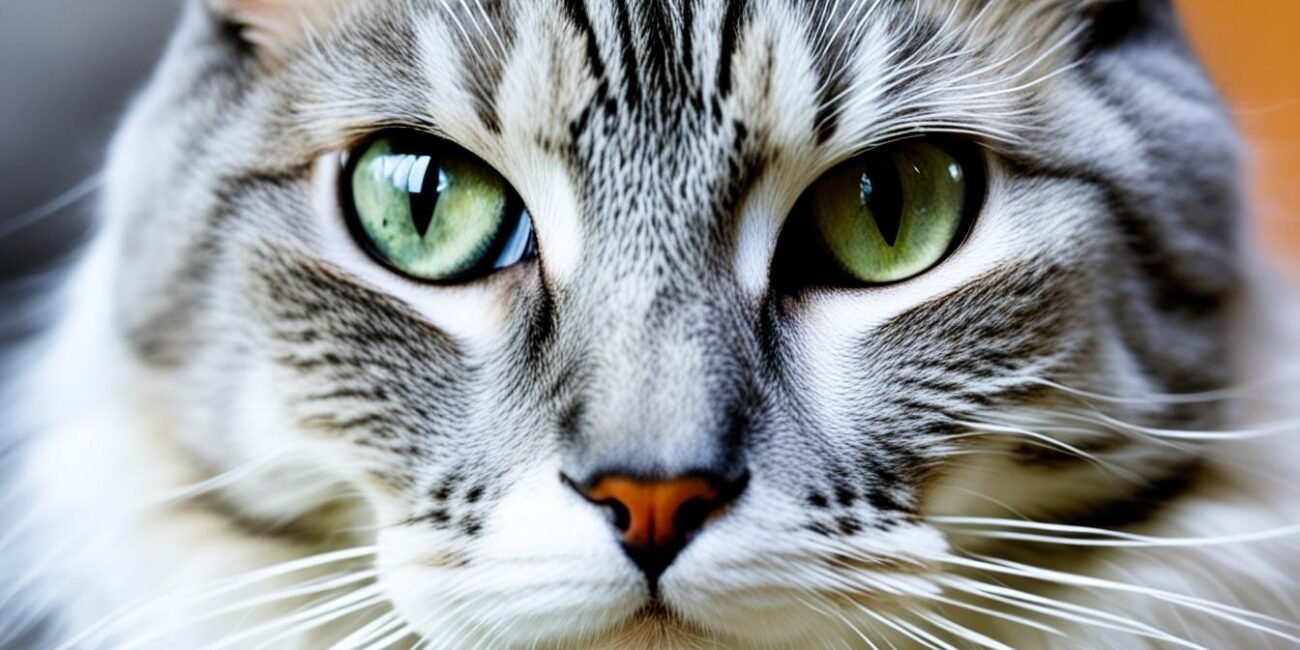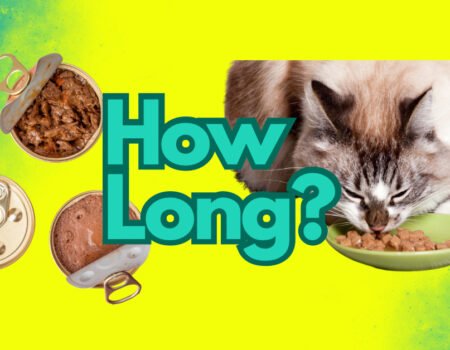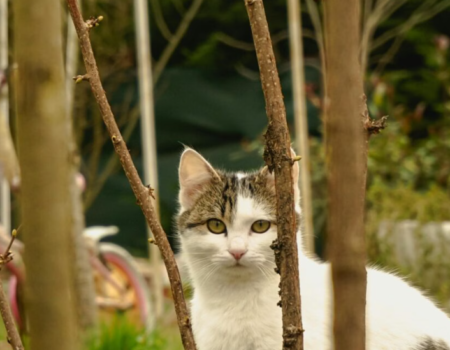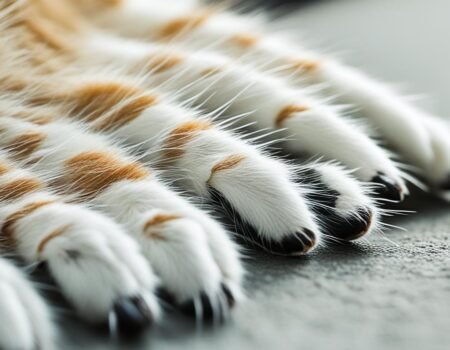“I believe cats to be spirits come to earth. A cat, I am sure, could walk on a cloud without coming through.” – Jules Verne
When it comes to our beloved feline friends, it is natural to wonder about their health and well-being. One common question that often arises is whether cats can have Down syndrome, a genetic disorder that affects individuals in the human population. In this article, we will explore the facts about feline health and genetic conditions, specifically addressing the possibility of cats having Down syndrome.
Understanding Down Syndrome in Humans
Down syndrome is a disorder that affects one in 700 human babies born in the US each year. It occurs when the genetic material is copied incorrectly, resulting in an extra chromosome 21 or a partial chromosome 21, also known as trisomy 21. This extra genetic material causes a variety of birth defects and physical traits commonly seen in people with Down syndrome, such as low muscle tone, small stature, upward slant to the eyes, and a single crease across the palm.
The presence of an extra chromosome 21 disrupts normal development and can lead to cognitive impairments, speech delays, and potential health issues, such as heart defects, hearing loss, and gastrointestinal problems. While the specific physical traits and developmental challenges may vary from person to person, they are characteristic of Down syndrome.
“Down syndrome is a genetic disorder caused by the presence of an extra copy of chromosome 21 in humans.”
The extra genetic material in Down syndrome affects various aspects of a person’s life, including their physical appearance, intellectual abilities, and overall health. It’s important to note that every individual with Down syndrome is unique and has their own strengths, challenges, and capabilities.
- Physical traits commonly associated with Down syndrome include:
- Low muscle tone
- Small stature
- Upward slant to the eyes
- A single crease across the palm
- Cognitive abilities and intellectual disabilities may range from mild to moderate.
- Speech and language development may be delayed.
- Individuals with Down syndrome may also experience certain health issues, such as heart defects, hearing loss, and thyroid problems.
Trisomy 21: Extra Chromosome 21
Trisomy 21, or the presence of an extra copy of chromosome 21, is the most common form of Down syndrome, accounting for about 95% of cases. This additional genetic material alters the course of development and contributes to the characteristic physical and cognitive features associated with the disorder.
“The extra genetic material in Down syndrome affects various aspects of a person’s life, including their physical appearance, intellectual abilities, and overall health.”
Although Down syndrome cannot be cured, early interventions, medical care, and supportive environments can greatly enhance the quality of life and developmental outcomes for individuals with Down syndrome. It is crucial to provide them with the necessary resources, education, and opportunities to thrive and lead fulfilling lives.
Why Cats Cannot Have Down Syndrome
Cats have a different genetic makeup compared to humans. While humans have 23 pairs of chromosomes, cats only have 19 pairs. As a result, cats cannot physically have an extra chromosome 21, which is the cause of Down syndrome in humans. The difference in chromosome count makes it biologically impossible for cats to have Down syndrome.
| Humans | Cats |
|---|---|
| 23 pairs of chromosomes | 19 pairs of chromosomes |
| Presence of an extra chromosome 21 can cause Down syndrome | No possibility for an extra chromosome 21 |
| Down syndrome is a genetic disorder | Unable to develop Down syndrome |
In humans, Down syndrome is caused by the presence of an extra copy of chromosome 21. However, due to the difference in the number of chromosomes between cats and humans, cats cannot have an extra chromosome 21 and are therefore unable to develop Down syndrome.
Can Cats Have Other Genetic Disorders?
While cats cannot have Down syndrome, they can still have other genetic disorders and chromosomal abnormalities. These conditions are unique to cats and are not related to the presence of an extra chromosome 21.
- Klinefelter syndrome, a rare chromosomal abnormality in male cats, can result in one extra chromosome and affect the cat’s coloration.
- Tricolored coats seen in calico or tortoiseshell cats are also caused by specific chromosomal abnormalities.
Cats may have genetic disorders that manifest in different physical traits and characteristics compared to humans. However, it’s important to understand that these conditions are distinct from Down syndrome and are not caused by the presence of an extra chromosome 21.
Understanding the genetic differences between cats and humans helps clarify why cats cannot have Down syndrome. While they may exhibit certain physical features resembling those associated with Down syndrome, these are not indicators of the genetic disorder itself.
Genetic Abnormalities in Cats
While cats cannot have Down syndrome, they can experience other chromosomal disorders that impact their health and appearance. One rare chromosomal abnormality in male cats is similar to Klinefelter syndrome in humans. This condition, known as Klinefelter syndrome in cats, involves the presence of an extra chromosome and affects the cat’s coloration.
Cats with Klinefelter syndrome may exhibit tricolored coats, which are commonly seen in calico or tortoiseshell cats. These unique coat patterns result from the abnormal distribution of pigmentation caused by the genetic abnormality. Despite the similarity to Klinefelter syndrome, it’s important to note that these genetic abnormalities in cats are distinct from Down syndrome and not related to the presence of an extra chromosome 21.
Understanding these genetic abnormalities in cats helps us appreciate the diversity and complexity of feline genetics. It reminds us that cats, just like humans, can have unique genetic variations that contribute to their individual characteristics.
Examples of Cats with Genetic Abnormalities
Let’s take a closer look at some fascinating examples of cats with genetic abnormalities:
- Calico Cats: Calico cats are known for their distinct combination of orange, black, and white fur. This unique coat pattern is a result of genetic factors, including the presence of the Klinefelter syndrome in some male calico cats.
- Tortoiseshell Cats: Tortoiseshell cats, also referred to as torties, display a patchy coat with a mix of different colors. This striking coat pattern is influenced by various genetic factors, including genes responsible for coat color and the presence of Klinefelter syndrome in some male tortoiseshell cats.
The Significance of Genetic Abnormalities in Cats
Genetic abnormalities in cats provide valuable insights into the complexities of feline genetics and the fascinating variations that can occur. They offer a glimpse into the diverse genetic makeup of cats and remind us of the intricate processes that shape their physical appearance.
“The presence of genetic abnormalities in cats highlights the endless possibilities of nature’s designs. It’s a testament to the beauty and complexity of feline genetics.”
Physical and Behavioral Abnormalities Resembling Down Syndrome
Some cats may exhibit physical and behavioral abnormalities that resemble those associated with Down syndrome. These abnormalities can be caused by a variety of factors, including infections, neurological diseases, congenital abnormalities, and trauma.
Cats infected with the panleukopenia virus in utero can show similar physical and behavioral traits. Additionally, conditions like cerebellar hypoplasia, exposure to toxins during pregnancy, and head or face trauma can also lead to physical and behavioral abnormalities in cats.
Physical Features and Abnormalities
Physical features that resemble Down syndrome in cats may include:
- Broad noses
- Upturned eyes
- Low muscle tone
- Difficulty walking
- Heart problems
These physical characteristics, however, do not indicate that the cat has Down syndrome but may be indicative of underlying health conditions or congenital abnormalities.
Behavioral Abnormalities
Cats with physical abnormalities resembling Down syndrome may also display behavioral abnormalities, such as:
- Delayed development
- Learning difficulties
- Aggression
- Anxiety
- Increased susceptibility to stress
It is important to note that these behavioral issues can have various causes, including neurological diseases, trauma, and congenital abnormalities. Consulting with a veterinarian is crucial to determine the underlying cause and provide appropriate care.
Expectations for Cats with Special Needs
Cats with special needs require extra care and attention from their owners. Whether they have physical disabilities or cognitive impairments, special needs cats depend on us to provide them with the necessary support and accommodations.
One of the key aspects of caring for special needs cats is to ensure their safety by protecting them from potential hazards in their environment. This can include securing windows and balconies to prevent falls, creating barriers around pools and stairs, and removing toxic plants or substances that could harm them. By taking these precautions, we can help prevent accidents and injuries.
In addition to safety measures, special needs cats often require additional care and assistance with their daily activities. This can involve helping them with basic functions such as feeding, grooming, and going to the litter box. It may also include providing mobility aids or ramps for cats with mobility issues.
Special needs cats with vision or hearing loss may need guidance and support to navigate their surroundings. Creating a predictable and structured environment can help them feel secure and confident.
Veterinary care is essential for the overall well-being of special needs cats. Regular check-ups and consultations with a veterinarian who is experienced in caring for special needs cats will ensure that any health issues are identified and addressed promptly. They can provide guidance on specific dietary requirements and recommend appropriate medications or treatments if needed.
Notable Quote:
“Caring for special needs cats requires patience, dedication, and a willingness to adapt to their unique needs. With the right care and support, these cats can live happy and fulfilling lives.”
Creating a safe and loving environment for cats with special needs is crucial. By understanding their individual requirements and providing the necessary care and accommodations, we can help them thrive and enjoy a high quality of life.
Next, we will explore some physical and behavioral characteristics that may resemble Down syndrome in cats, providing a deeper understanding of these unique feline companions.
Cats Resembling Down Syndrome
While cats cannot have Down syndrome, there are some felines that exhibit physical features resembling those commonly associated with the condition. These cats may have broad noses, upturned eyes, low muscle tone, difficulty walking, and heart problems. However, it’s important to note that these physical characteristics are not a result of Down syndrome in cats, but rather indicative of various underlying health conditions or congenital abnormalities.
I have always found it fascinating how certain cats can have similar physical traits to those seen in individuals with Down syndrome. However, as a copywriting journalist, it’s crucial to emphasize that these resemblances do not indicate the presence of the genetic disorder in cats.
For example, cats with broad noses and upturned eyes may have these traits due to the shape of their skulls or specific breed characteristics. Similarly, low muscle tone and difficulty walking can be the result of muscle or skeletal conditions, such as joint abnormalities or neurological disorders. Heart problems in cats can also arise from various cardiac conditions that are unrelated to Down syndrome.
It is essential for cat owners to understand that these physical features, although resembling those commonly associated with Down syndrome, do not indicate the presence of the condition itself. If a cat exhibits any concerning physical features or health issues, it is always advisable to consult with a veterinarian to determine the underlying cause and provide appropriate treatment.
While cats with Down syndrome-like physical traits may require specialized care and attention, it’s important to remember that each cat’s specific needs will vary. Veterinary guidance is crucial in order to provide the best possible care and ensure the well-being of these unique feline companions.
| Physical Features Resembling Down Syndrome in Cats | Underlying Causes |
|---|---|
| Broad noses | Skull shape or breed characteristics |
| Upturned eyes | Skull shape or breed characteristics |
| Low muscle tone | Muscle or skeletal conditions, neurological disorders |
| Difficulty walking | Muscle or skeletal conditions, joint abnormalities, neurological disorders |
| Heart problems | Cardiac conditions unrelated to Down syndrome |
Not Recognized by Veterinary Community
The term feline Down syndrome is not recognized by the veterinary community as a legitimate veterinary condition. It is important to understand the biological realities and rely on verified claims supported by scientific evidence when discussing feline health issues.
Cats possess distinctive physical appearances and behavioral traits that are unique to their species. While some cats may exhibit characteristics similar to those associated with Down syndrome in humans, it is crucial to remember that these similarities are not indicative of the condition itself.
Genetic testing is the most reliable method for confirming the presence of genetic disorders in cats. Claims about cats having Down syndrome purely based on their physical appearance or behavior have not been substantiated through rigorous genetic analysis.
An accurate understanding of feline health is vital in avoiding the misinterpretation and misrepresentation of genetic conditions. We must respect the significant differences between human and feline biology, as well as the lived experiences of individuals with conditions such as Down syndrome.
While cats may exhibit physical or behavioral characteristics resembling those associated with Down syndrome, it is essential to consult with veterinary professionals and rely on verified scientific research to understand the underlying causes. Exploring the biological realities of cats and their unique genetic makeup can enhance our understanding of feline health and well-being.
Feline Biomedical Realities
It is crucial to recognize that cats have a distinct biological makeup compared to humans. Cats possess 19 pairs of chromosomes, whereas humans have 23 pairs. The presence of an extra chromosome 21, which characterizes Down syndrome in humans, is simply biologically impossible in cats due to their unique genetic structure.
By acknowledging the biological realities, we can foster a more accurate understanding of feline genetic disorders and promote responsible discussions and research in the field of veterinary medicine.
Facts Over Speculation
While it is fascinating to compare physical appearances and behaviors between species, it is important to approach such observations with caution. The genetic variations and unique evolutionary paths of different species result in distinct physical and behavioral traits. Therefore, drawing direct parallels between feline characteristics and human conditions like Down syndrome should be avoided without verified scientific evidence.
Relying on unverified claims and unscientific speculation can lead to misunderstandings and misconceptions about feline health. It is essential to prioritize accurate information and scientific data when discussing genetic conditions in cats.
The Role of Genetic Testing
Genetic testing offers a reliable and accurate way to diagnose genetic disorders in cats. By analyzing the cat’s DNA, veterinarians and geneticists can identify any abnormalities or mutations that may contribute to physical and behavioral traits. Genetic testing is an essential tool in gaining a comprehensive understanding of feline genetics and promoting responsible breeding practices.
Consulting with veterinary professionals and relying on scientific research can help dispel unverified claims and provide accurate information about feline health and genetic conditions.
| Fact | Explanation |
|---|---|
| Feline Down syndrome is not recognized as a legitimate veterinary condition. | The veterinary community acknowledges that cats cannot have an extra chromosome 21, which is the genetic basis of Down syndrome in humans. The term “feline Down syndrome” is not recognized due to the biological realities of feline genetics. |
| Claims based on physical appearance or behavior have not been verified through genetic testing. | While some cats may resemble physical characteristics associated with Down syndrome, the absence of genetic testing makes it impossible to confirm such claims. Relying on verified scientific evidence through genetic analysis is crucial for accurate diagnosis. |
| Transferring human conditions to animals based on physical similarities may be disrespectful. | The veterinary community emphasizes the importance of respectful and accurate representation of Down syndrome and other human conditions. Drawing direct comparisons between feline characteristics and human conditions can perpetuate misconceptions and misunderstandings. |
Providing Care for Cats with Special Needs
Cats with special needs require specialized care. As a cat owner, it is crucial to work closely with veterinarians to provide the necessary support and healthcare for your feline companion. This involves making adjustments to accommodate their disabilities and creating a cat-safe home environment. Additionally, seeking appropriate medical treatments and regular veterinary check-ups are essential for maintaining the overall health and well-being of cats with special needs.
When caring for a cat with special needs, here are some important considerations:
1. Adjustments for Disabilities
Cats with disabilities may require specific accommodations to help them navigate their environment comfortably. This can include ramps or steps to assist them with climbing onto furniture or reaching certain areas. Providing litter boxes with low sides or open-top designs can make it easier for cats with limited mobility to access them. Additionally, providing soft bedding and gentle play toys can help alleviate any discomfort caused by physical disabilities.
2. Creating a Cat-Safe Home
Ensuring a cat-safe home environment is crucial for cats with special needs. Remove any potential hazards that could pose a danger to your cat, such as toxic plants, electrical cords, or small objects that can be ingested. Create designated safe spaces where your cat can retreat to and feel secure. Consider using baby gates or barriers to restrict access to hazardous areas, such as swimming pools or high balconies.
3. Veterinary Support
Regular veterinary check-ups and consultations are essential for cats with special needs. Your veterinarian will assess your cat’s overall health, monitor any ongoing conditions, and provide appropriate medical treatments. They can also offer advice on managing specific disabilities and recommend any necessary adjustments to your cat’s care routine.
4. Emotional Support
Cats with special needs may require additional emotional support. Spend quality time with your cat, providing plenty of love, attention, and interactive play. Be patient and understanding, as some cats may experience frustration or anxiety due to their disabilities. It may also be beneficial to consult with a professional animal behaviorist who can provide guidance on addressing any behavioral issues that may arise.
Remember, every cat is unique, and their specific needs may vary. By working closely with your veterinarian and providing the necessary care and support, you can ensure that your cat with special needs leads a happy and fulfilling life.
| Adjusted Care for Cats with Special Needs | Benefits |
|---|---|
| Making adjustments for disabilities | Enhanced mobility and comfort |
| Creating a cat-safe home | Prevention of accidents and injuries |
| Seeking veterinary support | Proper medical care and treatment |
| Providing emotional support | Improved overall well-being |
Conclusion
While it is not possible for cats to have Down syndrome due to their different genetic makeup, they can experience other genetic abnormalities and chromosomal disorders. As responsible cat owners, it is crucial to recognize the biological realities and consult with veterinarians if our feline companions display physical or behavioral abnormalities. By providing proper care and support, we can ensure the overall health and well-being of cats with special needs.
Cats with genetic abnormalities may require additional attention and specialized care. Collaboration with veterinarians is key in understanding and addressing their unique needs. Creating a cat-safe home environment, making adjustments for disabilities, and seeking regular veterinary check-ups are essential for their overall feline health. By being proactive in our approach, we can provide the best possible quality of life for our special cats.
While cats may exhibit physical features resembling those associated with Down syndrome, it is important to note that these characteristics are not a result of the syndrome itself. These physical attributes may be indicators of other underlying health conditions or congenital abnormalities, rather than a genetic disorder resembling Down syndrome. Thus, it is crucial to rely on accurate medical information rather than unverified claims.
FAQ
Can cats have Down syndrome?
No, cats cannot have Down syndrome. Down syndrome is a genetic disorder caused by the presence of an extra copy of chromosome 21 in humans. Cats have a different genetic makeup and only have 19 chromosomes, making it biologically impossible for them to have an extra chromosome 21.
What chromosomal disorders can cats have?
While cats cannot have Down syndrome, they can have other chromosomal disorders. One example is a condition similar to Klinefelter syndrome in humans, which results in an extra chromosome and affects the cat’s coloration, leading to tricolored coats seen in calico or tortoiseshell cats.
Can cats exhibit physical and behavioral abnormalities resembling Down syndrome?
Yes, some cats may have physical features and behavioral abnormalities that resemble those associated with Down syndrome. However, these abnormalities are not caused by Down syndrome itself but can be the result of various factors such as infections, neurological diseases, congenital abnormalities, or trauma.
How should I care for a special needs cat?
Special needs cats require specialized care. It is essential to work closely with a veterinarian to provide the necessary support and healthcare for these cats. This may include making adjustments for disabilities, ensuring a cat-safe home environment, and seeking the appropriate medical treatments.
What should I do if my cat exhibits physical or behavioral abnormalities?
If your cat exhibits physical or behavioral abnormalities, it is important to consult with a veterinarian. They can help determine the underlying cause and provide appropriate guidance and treatment for your cat’s specific needs.
Are cats with physical features resembling Down syndrome considered to have the condition?
No, cats with physical features resembling those commonly associated with Down syndrome do not have the condition. Their physical characteristics may be the result of various underlying health conditions or congenital abnormalities, rather than a genetic disorder resembling Down syndrome.
Is feline Down syndrome a recognized veterinary condition?
No, the term “feline Down syndrome” is not recognized by the veterinary community as a legitimate veterinary condition. Claims made about cats having Down syndrome, especially based on physical appearance or behavior, have not been verified through genetic testing.
How can I provide care for my special needs cat?
Providing care for a special needs cat requires veterinary support and additional attention. This may include making adjustments for disabilities, ensuring a cat-safe home environment, and maintaining regular veterinary check-ups for their overall health and well-being.
Can cats have genetic abnormalities?
While cats cannot have Down syndrome, they can have other genetic abnormalities and chromosomal disorders. Understanding the biological realities is important, and consulting with a veterinarian is recommended if your cat exhibits any physical or behavioral abnormalities.











No Comment! Be the first one.